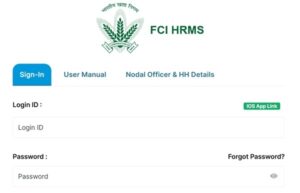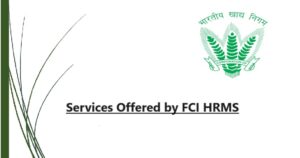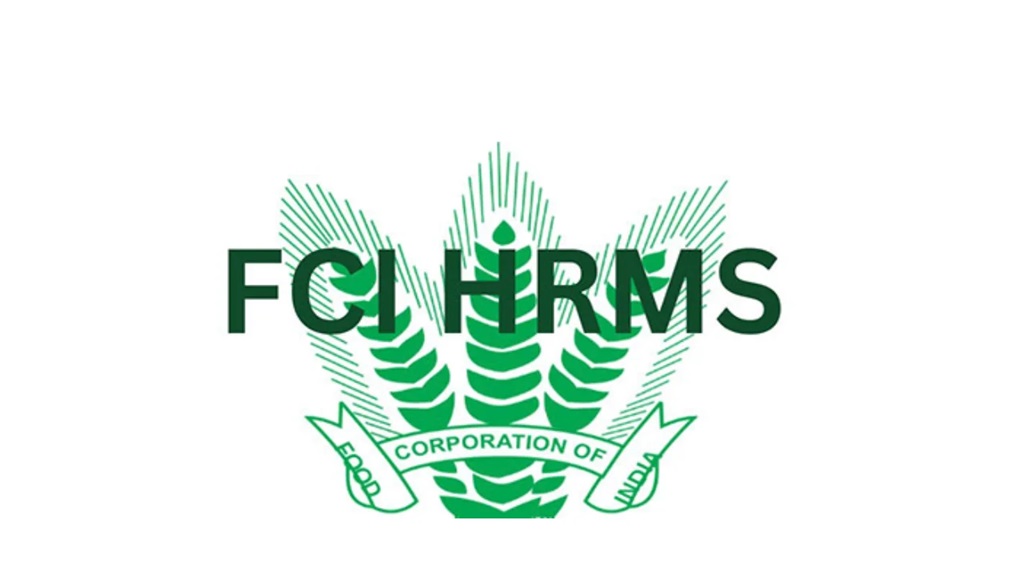The Food Corporation of India (FCI) is a pivotal organization in ensuring food security in India. One of the essential tools for managing its vast workforce is the Human Resource Management System (HRMS). The FCI HRMS provides a seamless interface for employees to manage their information, access various services, and streamline administrative processes. This article delves into the FCI HRMS login process, its uses, benefits, and the services it offers to employees.
FCI HRMS Login Process
Step-by-Step Guide to FCI HRMS Login
The FCI HRMS login process is straightforward and user-friendly, ensuring that employees can quickly access their accounts. Follow these steps to log in:
- Visit the Official Website: Go to the FCI official HRMS portal by entering the URL in your web browser.
- Enter Login Credentials: On the homepage, you will find the login section. Enter your Employee ID and Password.
- Captcha Verification: Complete the captcha verification process to ensure you are not a bot.
- Click on Login: After entering your credentials and captcha, click on the Login button to access your account.
If you are logging in for the first time or have forgotten your password, you can use the ‘Forgot Password’ option to reset it. Enter your registered email ID or mobile number to receive a password reset link or OTP.

User Manual Template FCI HRMS in pdf
Uses of FCI HRMS
The FCI HRMS serves as a comprehensive tool for employees to manage various aspects of their employment. Here are some of its primary uses:
Employee Information Management
Employees can view and update their personal information, including contact details, address, and emergency contacts. This ensures that the organization has up-to-date records for all its employees.
Leave Management
The HRMS allows employees to apply for leaves online. They can check their leave balance, apply for leave, and track the status of their leave applications. Managers can approve or reject leave requests through the system, making the process efficient and transparent.
Payroll Management
Employees can access their salary slips, view salary details, and download pay stubs. This feature simplifies payroll management and provides employees with easy access to their financial records.
Performance Management
The HRMS facilitates the performance appraisal process. Employees can set goals, track progress, and receive feedback from their managers. This process ensures that performance evaluations are conducted fairly and systematically.
Training and Development
Employees can register for training programs and workshops through the HRMS. They can also access training materials and track their progress in various developmental programs.
Benefits of FCI HRMS
The implementation of FCI HRMS offers numerous benefits to both the employees and the organization. Some of the key benefits include:
Efficiency and Time-Saving
The HRMS automates various administrative tasks, reducing the time and effort required for manual processes. This leads to increased efficiency and allows employees to focus on their core responsibilities.
Improved Data Accuracy
With employees updating their information directly in the system, the chances of errors in data entry are significantly reduced. This ensures that the organization maintains accurate and reliable records.
Enhanced Transparency
The system provides transparency in processes such as leave management and performance appraisals. Employees can track the status of their applications and understand the criteria for performance evaluations.
Better Communication
The HRMS serves as a central platform for communication between employees and the management. Important announcements, policy updates, and other communications can be disseminated through the system, ensuring that all employees are informed.
Accessibility
Employees can access the HRMS from anywhere, at any time, using their login credentials. This flexibility is particularly beneficial for employees working in remote locations or on-field assignments.
Services Offered by FCI HRMS

The FCI HRMS offers a wide range of services designed to cater to the diverse needs of its employees. Some of the notable services include:
Employee Self-Service (ESS)
The ESS portal empowers employees to manage their information, apply for leaves, access payslips, and perform other tasks independently. This reduces the dependency on HR personnel and speeds up various processes.
Manager Self-Service (MSS)
Managers have access to a dedicated portal where they can manage their team’s information, approve leave requests, conduct performance appraisals, and oversee other managerial tasks. This facilitates better team management and decision-making.
Recruitment Management
The HRMS streamlines the recruitment process by allowing HR personnel to post job openings, screen applications, and track the status of recruitment activities. This ensures that the organization can attract and onboard talent efficiently.
Attendance Management
Employees can mark their attendance through the HRMS, and managers can track attendance records. This feature helps in maintaining accurate attendance logs and simplifies payroll processing.
Grievance Management
The HRMS provides a platform for employees to raise grievances and track the resolution process. This ensures that employee concerns are addressed promptly and effectively.
Document Management
Employees can upload and access important documents such as ID proofs, educational certificates, and experience letters through the HRMS. This centralizes document storage and retrieval, making it easier to manage employee records.
Retirement and Pension Management
For employees nearing retirement, the HRMS offers tools to manage retirement plans and pension benefits. This includes information on retirement policies, pension calculations, and the submission of necessary documents.
Conclusion
The FCI HRMS is a vital tool that enhances the efficiency and effectiveness of human resource management within the Food Corporation of India. By streamlining processes, improving data accuracy, and providing a central platform for communication and management, the HRMS contributes significantly to the overall productivity and satisfaction of employees. The comprehensive services offered by the HRMS ensure that both employees and managers can perform their tasks efficiently, leading to a more organized and responsive workforce.


